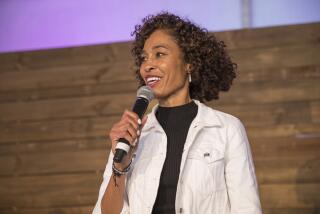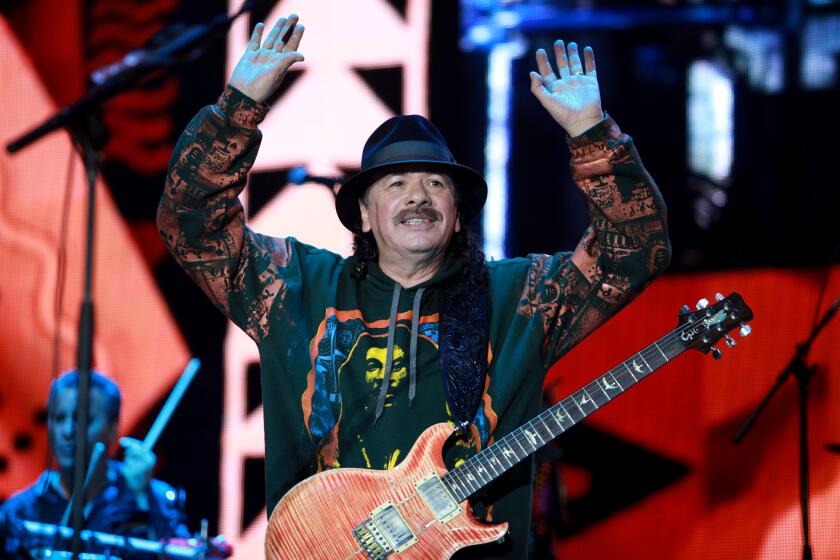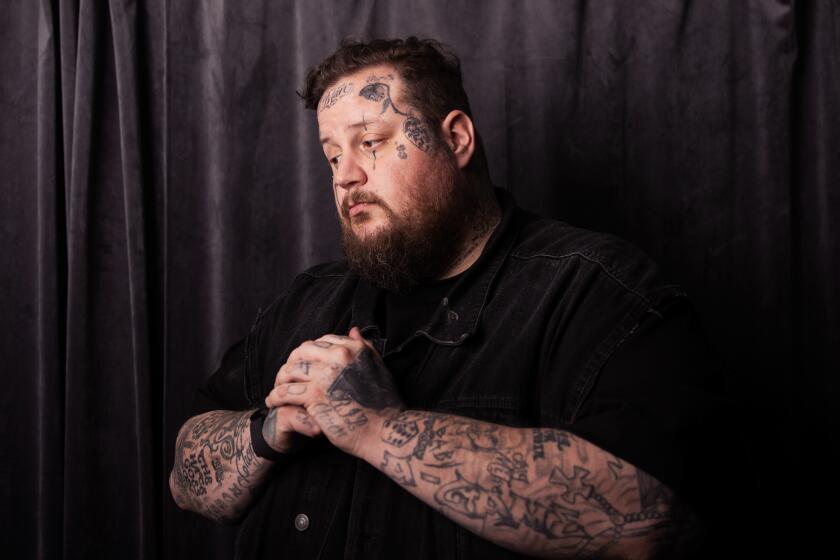‘Real’ Don Steele, Style-Setting L.A. Deejay, Dies at 61
- Share via
The death Tuesday of deejay “the Real” Don Steele evoked the mega-decibel cries of late 1960s Top 40 radio when Steele and other “boss jocks” ruled the airwaves and captured Los Angeles’ hip teenagers as the audience of 93-KHJ.
“It’s 3 o’clock in Boss Angelese! Hey hey HEY! Thitz me. The Real Don Steele!” he would scream through dashboard speakers and teen hangouts during radio’s afternoon drive time on a typical Friday. “A billion-dollar weekend there. . . . I got nothing but groovy, those groovy golds. We’re gonna kick it out here on a fractious Friday, boy. Got to get a set outside that [unintelligible] work resembling blowing bubbles in a glass of water! Jumbo city! [Pause] Take a trip. When you chase ‘em daylight!”
Less frenetic listeners tuned out Steele’s light-speed patter, claiming they couldn’t understand a word he said. More adored him and became devoted fans, and colleagues emulated him. His tapes were studied in broadcast schools and mimicked at other Top 40 and oldies stations.
Steele, who had been heard on KRTH-101 (K-EARTH) until mid-May, died in his sleep Tuesday morning at his Hollywood Hills home of lung cancer. The entertainer, who had given up smoking 10 years ago, was 61.
Steele was on the air the first afternoon KHJ shifted to rock and, although in recent years the music was called “oldies,” he never stopped spinning the records or spouting the shtick.
“We were standing literally at ground zero; then it became a huge giant,” he said of the station’s introduction of “Boss Radio” to Southern California. “It was like a mushroom cloud that went up--heavy on the mushroom.”
Although Steele didn’t coin the “boss” terms, he was the first to deliver the phrase “Boss Radio in Boss Angeles” on the air.
Steele’s fertile mind and glib tongue were also responsible for his personal mantra familiar for 40 years: “Tina Delgado is alive, alive!” which was echoed knowingly by teenagers across Southern California.
“This must be a very sad day for the mythical Tina Delgado,” said Don Barrett, radio historian and author of the anthology “Los Angeles Radio People,” when he learned of Steele’s death.
In 1967 and 1968, Billboard magazine named Steele the No. 1 air personality in influencing the sales of record singles. In 1995, he was given a star on the Hollywood Walk of Fame for his contributions to radio.
A poll seeking the top 10 disc jockeys in Los Angeles from 1957 to 1997 rated Steele second among the 232 personalities nominated. The ballot was printed by Barrett in his 1994 book, and results will be published in the second volume of his book, due out Sept. 1.
“He never compromised his energy or his style,” Barrett said of Steele on Wednesday. “He was consistent from day one of Boss Radio in 1965 until a short time ago.”
K-EARTH morning colleague Robert W. Morgan, who also ranked in the top 10 in Barrett’s poll (the author won’t reveal the rankings until the book comes out), says of Steele in the book: “A radio animal! He’s the absolute best at what he does. Sounds better now than he did 30 years ago . . . if that’s possible.”
Ironically, K-EARTH announced in May that Morgan had left the station to undergo therapy--also for lung cancer.
Popular deejay Rick Dees, another voted among Barrett’s top 10, says of Steele in the book: “Pure, raw energy and focus. And he still has it every day. That’s amazing!”
In the 1980s, Steele broadcast a syndicated radio show, “Live from the Sixties,” which was heard in about 300 cities.
Steele was loved not only for his thunder-and-lightning speech but for what he could say in those loud and fast phrases--if you listened closely.
“He was so concise,” Barrett said. “He said more in fewer words than anybody in the history of Los Angeles radio.”
The shtick barely tapped an incredible wit and glossed over a considerable intellect, according to Steele’s former newscaster colleague Boyd R. Britton, now known as Doc on the Roq of KROQ radio.
“He educated me in star quality, in energy and focus,” said Britton, who worked with Steele in the late 1970s at KTNQ. “He epitomized energy on the air.”
With his high-decibel voice, the impeccably dressed Steele stood out in popular clubs and restaurants as he did on the air.
“Very early on he was extremely hearing damaged,” Britton said, attributing the impairment to disc jockeys’ habit of listening to records at top headphone volume in order to determine the proper mix for the air. “It was very difficult for him to hear in a group. That made his natural speaking voice almost as loud as his on-air voice.”
Although best-known for his consistent and durable radio presence, Steele also became a fixture on television and in B movies.
From 1968 to 1975 he was on television Saturday nights with “The Real Don Steele TV Show,” a rock ‘n’ roll dance show with guest stars such as the Rolling Stones and the Supremes.
As his wife, Shaune, described it Wednesday: “The Real Don Steele, armed with a nubile dancer on either side, pranced across the screen as the Saturday night king of TV rockdom.”
In addition to his own show, Steele made guest appearances in television movies, as a disc jockey in “The Day the Earth Moved,” as himself in “KISS Meets the Phantom of the Park,” as a boat coordinator in “Anything to Survive” and as--what else--XRAY the Deejay in “Runaway Daughters.
In motion pictures, Steele played fast-talking hipster characters in what became cult films by Roger Corman and others.
He was Junior in “Death Race 2000,” Curly Q. Brown in “Grand Theft Auto” and Screamin’ Steve Stevens in perhaps the most popular film of its type, “Rock ‘n’ Roll High School.” He also played the host in “Eating Raoul,” Rockin’ Ricky Rialto in “Gremlins” and Charlie Caddo in “Nowhere to Run.” Just last year Steele portrayed a driver in “Tales From the Crypt Presents: Bordello of Blood.”
Born in Hollywood on April Fools’ Day of 1936, Steele graduated from Hollywood High School, served in the Army and then studied at a local radio school. In the next four years, he worked at radio stations in Beverly Hills, Glendale, Corona and Riverside, moved on to Kennewick, Yakima and Spokane, Wash., and then to Omaha, Portland and San Francisco. KHJ brought him home.
Playing Top 40 hits, Steele always insisted, involved personality as much as music--preferably his personality.
“If you can make a cat in a jam on the freeway giggle, that’s it,” he told The Times in 1967 as he soared toward his peak popularity. “I’m there to be a super-entertainer, not to teach people or sway minds. It’s pressure, but it’s what [President Harry S.] Truman said about politics, if heat ain’t for you, get out of the kitchen.”
Proud of his much-lauded consistency, Steele told The Times in 1993 from his berth at K-EARTH: “I don’t think I’m any different now. I’ve never stopped. I’ve never changed. I never did anything else. This is the music of my life.”
Steele’s widow, Shaune, his only survivor, said private services are pending.
More to Read
The biggest entertainment stories
Get our big stories about Hollywood, film, television, music, arts, culture and more right in your inbox as soon as they publish.
You may occasionally receive promotional content from the Los Angeles Times.










